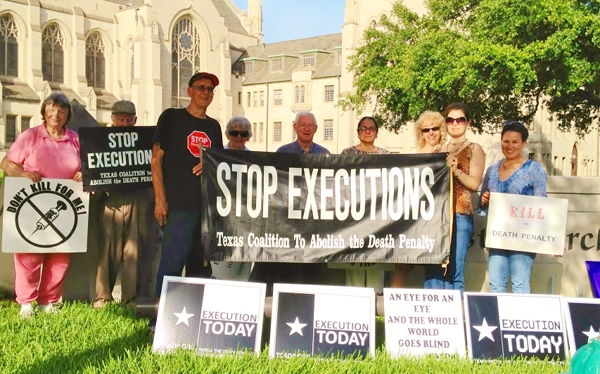
PHOTO/JENNIFER SIMMONS
HOUSTON — Protests took place across Texas as the state executed its 500th prisoner since capital punishment started again in the state in 1982. Kimberly Clark, an African-American woman, was executed on June 26, 2013. She is the fourth woman executed by Texas in recent history, the other three being Karla Faye Tucker (1998), Betty Lou Beets ( 2000) and Francis Newton (2005).
Texas is the leading state in the nation when it comes to executing its citizens. It has more executions than the next six states combined (Virginia =110, Oklahoma = 103, Florida = 77, Missouri = 68, Alabama = 55 and Ohio = 51). The high number of executions can be attributed to politics and a criminal justice system tainted with economic and racial biases. The racial biases recently came to light with the case of Duane Buck, an African-American man who was sent to death row after he was described by a psychologist as a danger to society because of his race. A petition for a new sentencing hearing for Duane Buck can be found on www.change.org.
As the 500th execution was approaching in Texas, many of us asked, “How many of those 500 people were actually innocent?” We knew that our criminal justice system was flawed since there had been 12 people officially exonerated and released from death row in the past 30 years, the last one being Anthony Graves. And there was strong evidence that several people who had been executed, such as Cameron Todd Willingham, Ruben Cantu and Carlos De Luna, were actually innocent. It is not a stretch to say that, out of the 500 executions, 10 or more people could have been innocent.
Despite this dismal history, there is some good news on the horizon. Executions are decreasing in Texas as they are across the nation. Texas executed 16 people in 2012 compared to 40 in 2000. As of July 16, 2013, there have been 9 executions in Texas. There are several reasons for the drop in executions, one being that the citizens of the state are becoming more aware of flaws in the criminal justice system such as mistaken eyewitness identification, false confessions and prosecutorial misconduct. Citizens are also becoming more aware of the cost of the death penalty. A study by the Dallas Morning News in 1992 estimated the average cost of a death penalty case to be $2.3 million dollars versus $750,000 for a life sentence. The disparity is largely due to the huge legal expenses associated with capital punishment. The money wasted on the death penalty could be better used for effective crime prevention measures.
Six more executions are currently scheduled in Texas during 2013. Information about scheduled executions can be obtained by going to the website of the Texas Coalition to Abolish the Death Penalty (www.tcadp.org).
Whenever an execution takes place in Texas, it is covered live on Execution Watch on Pacifica Community Radio’s local station in Houston (www.KPFT.org). Past shows are available in the KPFT Execution Watch archives. Letters can be sent to Execution Watch, KPFT Radio, 419 Lovett Blvd, Houston, TX 77006.
David Atwood, Founder, Texas Coalition to Abolish the Death Penalty can be reached at dpatwood@igc.org
